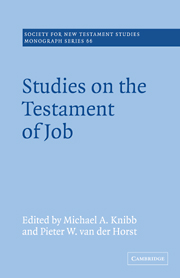Book contents
- Frontmatter
- Contents
- List of abbreviations
- 1 Introduction
- 2 The Testament of Job: a history of research and interpretation
- 3 P. Köln Inv. Nr. 3221: Das Testament des Hiob in koptischer Sprache. Ein Vorbericht
- 4 Zur Komposition und Konzeption des Testaments Hiobs
- 5 Images of women in the Testament of Job
- 6 Job's perseverance in the Testament of Job
- Index of passages
- Index of authors and subjects
2 - The Testament of Job: a history of research and interpretation
Published online by Cambridge University Press: 07 October 2009
- Frontmatter
- Contents
- List of abbreviations
- 1 Introduction
- 2 The Testament of Job: a history of research and interpretation
- 3 P. Köln Inv. Nr. 3221: Das Testament des Hiob in koptischer Sprache. Ein Vorbericht
- 4 Zur Komposition und Konzeption des Testaments Hiobs
- 5 Images of women in the Testament of Job
- 6 Job's perseverance in the Testament of Job
- Index of passages
- Index of authors and subjects
Summary
For much of the modern period, the Testament of Job (T. Job) has been one of the lesser-known pseudepigraphic products of early Judaism. Approximately the length of the NT book of Romans, T. Job celebrates the virtue of patience (ὑπομονή) through a folkloristic elaboration of the biblical story of Job that may be compared in its method of treatment with the elaboration of incidents in the lives of the patriarchs by the author of the Testaments of the Twelve Patriarchs.
Early use
Ancient references
Among eight lists (ranging from the fourth to the fourteenth centuries) distinguishing biblical from non-canonical books, only the sixth-century Gelasian Decree (5.6.4) mentions a ‘Liber qui appellatur Testamentum Job, apocryphus’. The same Decree (5.8.6), interestingly enough, proscribes ‘Phylacteria’: according to T. Job 47.11, it was by one such φυλακτήριον that Job was cured of his illness. M.R. James records the suggestion that T. Job 20.7–9 served as Tertullian's source for a reference to Job's worm-ridden illness (De patientia 14.5, c. AD 200–203), and the same tradition appears in the Visio Pauli as well as the Aboth de Rabbi Nathan. The book, it seems, was as little used in ancient times as in the modern era.
Ancient versions
Until the query of Denis can be settled by evidence – ‘une version latine est peut-être visée par Décret gélasien, [5.]6.4' – one must say that T. Job is known in only two ancient versions, one of those as yet unpublished.
- Type
- Chapter
- Information
- Studies on the Testament of Job , pp. 7 - 32Publisher: Cambridge University PressPrint publication year: 1990



